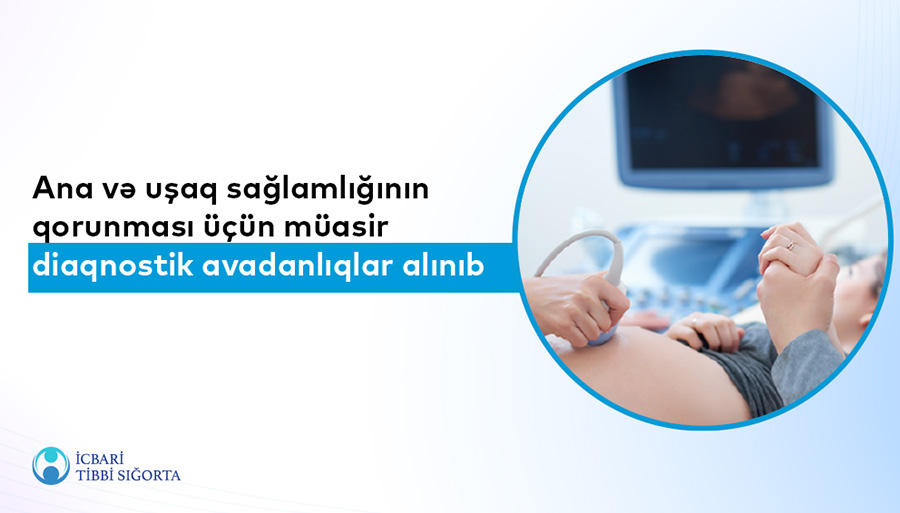14 April 2023 11:30
Modern medical equipment was purchased to protect the health of mothers and children
Modern medical equipment, devices, and tools have been purchased by the State Agency on Mandatory Health Insurance (Agency) to improve the quality and efficiency of medical services provided to mothers and children. The newly purchased medical equipment will be used for the examination and treatment of pregnant women – as well as children in the perinatal, neonatal, and postneonatal periods – in medical facilities attached to TABIB.
Twenty-seven modern ultrasound machines were purchased for conducting transabdominal and transvaginal gynecological examinations. These examination methods are used to detect intrauterine polyps, myomas, and masses. It is possible to detect many diseases with a gynecological ultrasound evaluation, which covered under the mandatory health insurance. Gynecological ultrasonography examination involves examining the uterus, ovaries, cervix, uterine tubes, and small pelvis.
Nine three-dimensional (3D) ultrasonography machines were purchased for monitoring the progress of pregnancy, allowing for more accurate visualization of the stages of fetal development. This examination method provides information about the physiological and pathological development of the fetus in the earlier stages of pregnancy. Unlike two-dimensional (2D) ultrasonography machines, innovative 3D ultrasonography technology describes the examined area more accurately, which allows the treating doctor to make prompt decisions.
In addition, ten cardiotocography (CTG) machines were purchased; these allow for the assessment of the state of the fetus based on the heartbeat in the womb. It is also possible to detect intrauterine oxygen deficiency (i.e., hypoxia) and uterine tone through CTG scan. Cardiotocography of the fetus is performed after the 28th week of pregnancy based on medical instructions.
Fifty neonatal incubators and 20 phototherapy devices were purchased for use with premature babies. It is possible to control the air and the baby's body temperature and humidity in the incubators by means of a sensor panel. For the X-ray examination of newborns, the tubs are equipped with X-ray cassettes.
Phototherapy devices are used to reduce the level of hyperbilirubinemia (i.e., neonatal jaundice) in newborns. Phototherapy devices are equipped with light-emitting diode (LED) lamps with a wavelength of 430-490 nanometers. This is one of the main factors for the treatment being effective.
Twenty artificial breathing devices have been purchased for the respiratory therapy of premature babies in severe condition. The devices are intended to protect the lives of newborns by providing them with continuous oxygen.
Ten simple and electric gynecological examination tables, ten colposcopes, 20 examination lamps, and 20 portable lamps were purchased for gynecological examinations. In addition, one pediatric gastroscopy device was purchased for the endoscopic examination of children's digestive systems.
In addition, there are plans to distribute 20 newly purchased baby-changing tables, 20 baby scales, 20 mechanical ventilators for newborns, 20 scales, 10 pediatric electric beds, and 50 infant hospital cribs to perinatal centers and maternity hospitals.
It should be noted that, in 2022, the Agency purchased a total of 1,768 pieces of equipment, devices, tools, and supplies of 108 types. These will be used to provide medical services in both outpatient and inpatient conditions in state health facilities.
It is planned to deliver the equipment to state health facilities subordinated to the Administration of Regional Medical Divisions (TABIB) in 2023 in accordance with their needs.
News
İcbari tibbi sığorta ilə 182 000-dən artıq doğuş aparılıb
16 July 2024 11:10
Diz oynağının endoprotezləşməsində İsveçrə istehsalı protezlərdən istifadə olunur
12 July 2024 10:42
Kəskin orta otitin cərrahi müalicəsi icbari tibbi sığorta ilə qarşılanır
09 July 2024 11:11
Tiroidektomiya əməliyyatı icbari tibbi sığorta ilə ödənişsizdir
05 July 2024 10:25
İcbari tibbi sığorta ilə qasıq yırtığı açıq və laparoskopik üsulla icra olunur
01 July 2024 15:18
İcbari Tibbi Sığorta üzrə Dövlət Agentliyinin nümayəndə heyəti Yaponiyaya işgüzar səfər edib
28 June 2024 10:51
İcbari tibbi sığorta ilə 540 splenektomiya əməliyyatı icra olunub
24 June 2024 14:52
Zaur Əliyev Goranboy şəhərində vətəndaşları qəbul edib
21 June 2024 17:00
İcbari tibbi sığorta uşaqlığın çıxarılması əməliyyatını qarşılayır
21 June 2024 10:57
Agentlik, TƏBİB və Ankara Universiteti üçtərəfli anlaşma memorandumu imzaladı
14 June 2024 14:49










